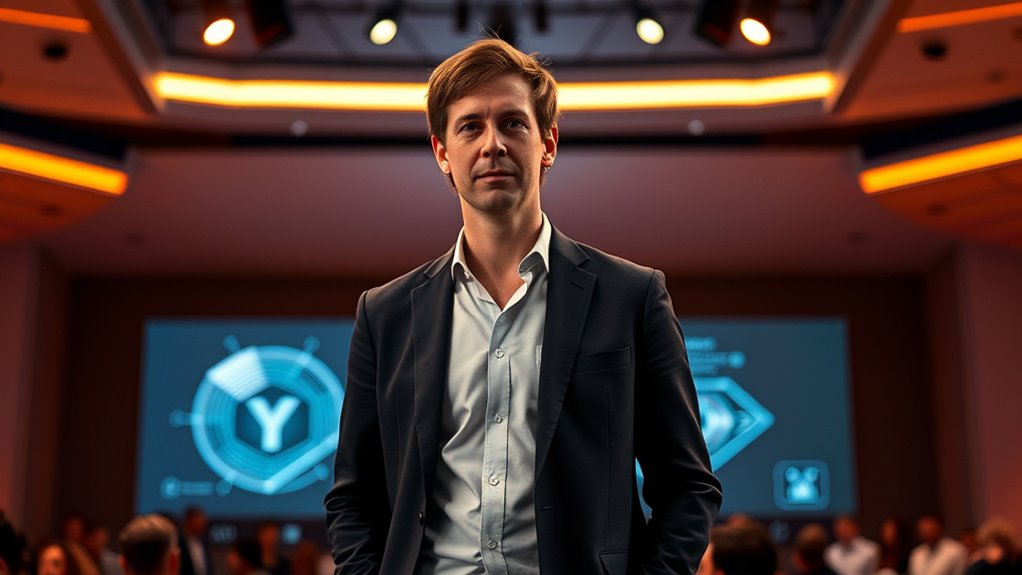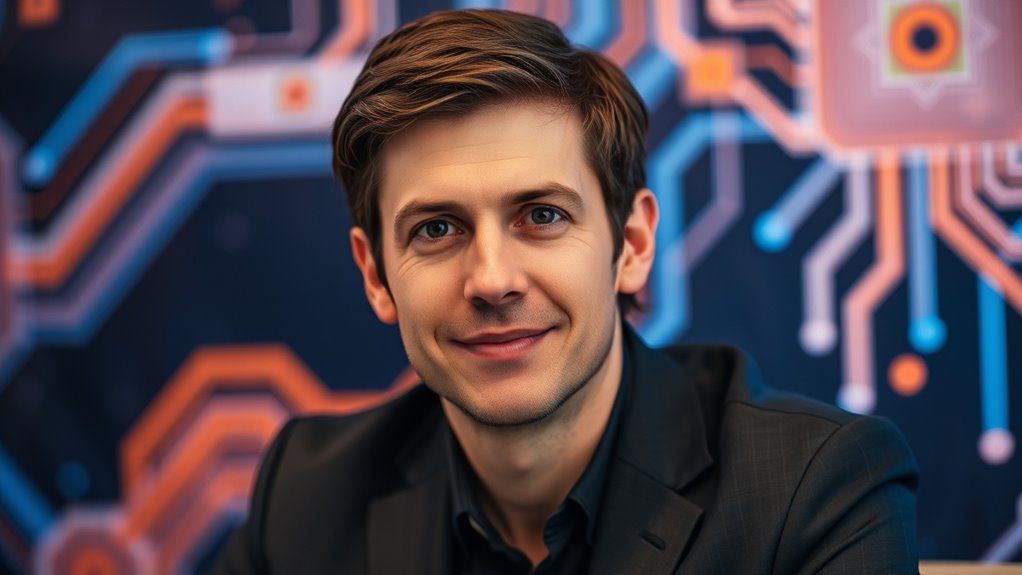Sam Altman is a key figure in tech, leading OpenAI as its CEO and driving AI innovation. From growing up in Missouri to founding OpenAI with a mission to benefit humanity, he’s shaped breakthrough models like GPT-4 that transform industries. His leadership has influenced AI’s future, balancing innovation with safety and ethics. If you keep exploring, you’ll discover how his journey impacts technology and society today.
Key Takeaways
- Sam Altman is the CEO of OpenAI, leading AI development with a focus on safety, ethics, and societal benefit.
- He co-founded OpenAI in 2015 to ensure AI benefits all humanity and transitioned it to a capped-profit model in 2019.
- Altman previously served as president of Y Combinator, fostering innovation and funding influential tech startups.
- Under his leadership, OpenAI developed groundbreaking models like GPT-4, transforming industries and human-AI interaction.
- He is recognized as a leading tech innovator, shaping AI policy, ethics, and future technological advancements.
Early Life and Educational Background

Did you know that Sam Altman’s early fascination with computers shaped his future? Growing up in the suburbs of St. Louis, Missouri, he showed a knack for numbers and technology from a young age. At just eight, he received his first computer, an Apple Macintosh, which became both a tool and emotional support during tough childhood moments. His family background is rooted in a Jewish tradition, with a mother who’s a dermatologist and a father in real estate. Sam attended the prestigious John Burroughs School, where he advocated for LGBTQ+ inclusivity, coming out publicly during a school assembly. Later, he enrolled at Stanford University to study computer science but left after two years to pursue his startup ambitions, laying the foundation for his future in tech entrepreneurship. Understanding early technical interests can provide insight into how his passion for computers influenced his career path.
Ascension at Y Combinator

Sam Altman’s rise at Y Combinator began when he joined as a part-time partner in 2011, quickly immersing himself in funding and mentoring early-stage startups. During this time, you’d notice him helping shape YC’s culture and expanding its network. Working closely with co-founders, he gained valuable insight into accelerator operations and startup growth, laying the groundwork for future leadership. In 2014, he was named YC president, where he accelerated the program’s scale, aiming to fund 1,000 startups annually. He shifted focus towards “hard technology,” boosting YC’s valuation to over $65 billion with companies like Airbnb and Stripe. His leadership emphasized a founder-friendly environment, strategic growth, and innovation, setting YC on a path of global influence and success. His experience with early AI research and technological progress also contributed to shaping his vision for the future of innovation and AI-driven startups. Additionally, his background in tech innovation provided him with a unique perspective on emerging trends and future opportunities.
Founding and Growth of OpenAI

OpenAI was founded in 2015 with a clear mission to ensure AI benefits all of humanity, bringing together top tech leaders with a shared vision. As it shifted from a non-profit to a capped-profit model in 2019, it gained the flexibility to scale rapidly while maintaining its core goals. Over the years, major breakthroughs like GPT models have positioned OpenAI as a leading force in AI innovation, shaping its growth and impact. The organization also emphasizes ethical AI development, prioritizing responsible and safe deployment of its technologies.
Founding Vision and Goals
What drove the founding of OpenAI was a shared commitment to developing artificial general intelligence (AGI) that benefits humanity, rather than concentrating power in the hands of a few tech giants. You learn that it was founded in December 2015 by Sam Altman, Elon Musk, Ilya Sutskever, Greg Brockman, and others, with a pledge of $1 billion from investors like Musk, Altman, Reid Hoffman, Peter Thiel, and AWS. Their goal was to create safe, beneficial AGI accessible to everyone, countering risks from unchecked development by firms like Google DeepMind. OpenAI aimed to promote openness, collaboration, and ethical responsibility, sharing research freely. Their vision focused on empowering humans, distributing benefits fairly, and maintaining a high standard of safety amid ambitious global aspirations. Additionally, the founders emphasized the importance of project transparency to ensure responsible development and deployment of AI technologies.
Transition to Cap-Profit Model
As OpenAI grew, its nonprofit structure limited access to the large-scale funding needed for cutting-edge AI research. To overcome this, they shifted to a cap-profit model, creating OpenAI LP in 2019. This move attracted major investments, like Microsoft’s $1 billion, and raised over $6.6 billion by 2024, boosting valuation beyond $150 billion. The new structure allowed for equity incentives, helping attract top talent and strategic partnerships. Key points include:
- Creating OpenAI LP to enable profit-driven investments while maintaining mission focus. OpenAI LP was established to secure significant funding and facilitate profit-making activities.
- moving to a Public Benefit Corporation in 2025, emphasizing societal impact. This corporate structure helps align the company’s goals with social responsibility.
- Capping investor returns at 100x, balancing profits with ethical commitments.
This shift unblocked resources, strengthened market position, and fueled rapid AI development.
Major AI Developments and Impact
Founded in December 2015 by a group of prominent tech leaders including Sam Altman, Greg Brockman, and Elon Musk, OpenAI set out to develop AI that benefits humanity. The organization quickly made major strides, releasing tools like OpenAI Gym and Universe to advance reinforcement learning and general intelligence. Its mission prioritized safety and collaboration, attracting top researchers despite initial funding challenges. OpenAI’s growth was fueled by partnerships with AWS and others, and its open research fostered industry influence. The founders’ concerns over AI misuse motivated their focus on responsible development. Their efforts resulted in groundbreaking innovations that transformed AI capabilities and set new standards for transparency and cooperation in the field. Additionally, their commitment to AI safety has been central to guiding ethical advancements in artificial intelligence.
Breakthroughs With AI Technologies

You’ve seen how groundbreaking AI models now generate high-quality content and mimic voices, transforming industries overnight. As human-AI interactions evolve, ethical considerations become more critical to guarantee responsible development. These breakthroughs challenge us to balance innovation with societal impact, shaping AI’s future in profound ways. Substantial job displacement is becoming an inevitable consequence of AI advancements, prompting urgent discussions about economic and social policies to manage this transition. Incorporating mindful decluttering strategies can help organizations and individuals better adapt to rapid technological changes and reduce unnecessary material accumulation that may hinder progress.
Groundbreaking AI Models
Have recent advancements in AI models truly transformed what machines can achieve? Absolutely. New iterations like GPT-4 have unleashed unprecedented abilities, enabling AI to perform complex tasks across industries. These models now excel at abstraction, summarization, and problem-solving, often surpassing human performance. The progress has been exponential, with each generation pushing boundaries further. As a result, AI can now:
- Accelerate scientific discoveries, such as designing better chips or aiding in drug development with minimal human input.
- Solve intricate business problems, streamlining operations and innovation cycles.
- Enhance automation, creating AI systems capable of autonomous research and complex decision-making.
- Continued exponential progress in AI capabilities is expected to unlock even more transformative opportunities across sectors. This rapid development underscores the importance of AI safety and ethics as these technologies become increasingly integrated into our daily lives.
These breakthroughs signal a shift toward AI models that are not only more powerful but also more integral to advancing science, industry, and technology.
Human-AI Interaction Evolution
How have recent AI technologies transformed the way humans interact with machines? You now experience more natural, conversational communication thanks to OpenAI’s Input/Output devices. These interfaces mimic human dialogue, adapting to your preferences and simplifying tasks like managing schedules or controlling smart environments. AI reduces the learning curve, making technology accessible to everyone. You can seamlessly interact with smart home devices, wearables, and workplace tools, boosting daily efficiency. Imagine:
| Traditional Interaction | Modern Human-AI Interaction |
|---|---|
| Rigid commands | Human-like dialogue |
| Complex setup | Human-centered design |
| Limited accessibility | Broad usability |
| Isolated devices | Integrated environments |
| Technical expertise needed | User-friendly experience |
This evolution makes AI more practical, human-centric, and embedded into your routines. Transforming AI Interaction is further supported by advancements in integration, allowing your devices and environments to work together seamlessly. Recent developments also include adaptive learning capabilities that personalize interactions over time, enhancing user satisfaction and effectiveness.
Ethical AI Development
Recent breakthroughs in AI technologies are transforming ethical development by emphasizing transparency, fairness, and safety. You now have tools like OpenAI’s expanded Model Specification, which enhances ethics, transparency, and adaptability. These frameworks explicitly address bias mitigation, promoting equitable AI outputs. OpenAI’s commitment to transparency means you can understand and trust AI decision processes, with mechanisms to identify and correct societal harms. Accountability structures hold developers responsible for AI’s impact, fostering responsible innovation. Key breakthroughs include customizable models that respect legal boundaries, integration of truth-seeking principles, and reinforcement learning aligned with human values. These advancements influence industry standards and policies, encouraging responsible practices across sectors. Ultimately, ethical AI development aims to maximize societal benefits while minimizing risks like bias, misuse, and privacy violations. The expanded Model Spec also emphasizes ethical commitment and global collaboration, ensuring that AI development aligns with diverse societal values.] Additionally, incorporating robust safety measures is essential to prevent unintended consequences and safeguard public trust in AI systems.
The Impact of ChatGPT on Society

The impact of ChatGPT on society is profound and multifaceted, transforming how we communicate, learn, and work. With over 200 million monthly users by mid-2023 and 1.6 billion visits, it’s reshaping digital interaction worldwide. Education and business sectors lead adoption, with thousands of companies and institutions integrating ChatGPT for tutoring, content, and automation. Its mobile app downloads surpass 110 million, highlighting widespread engagement. Financially, it generated around $1.6 billion in 2023, expected to reach $2.7 billion in 2024, dominating AI subscription markets. Societally, ChatGPT fosters creativity, enhances productivity, and influences cultural discourse on AI ethics. Its multilingual capabilities and global reach, especially in the US and India, make it a indispensable tool that’s altering communication patterns and expanding access to knowledge across diverse communities.
The 2023 Board Dispute and Reinstatement

You are trained on data up to October 2023. In late 2023, OpenAI faced a major crisis when Sam Altman was removed as CEO by the board on November 17. The board cited a lack of candor in his communications, but key disagreements involved AI safety, development speed, and commercialization. The turmoil led to protests and resignations from top staff, including Greg Brockman. Just five days later, Altman was reinstated after employee and external pressure, with a restructured board overseeing him. This episode exposed governance issues and highlighted the tension between innovation and leadership.
- Altman’s removal due to communication issues and disagreements
- Employee protests and internal chaos
- His quick reinstatement and board restructuring
Recognition and Influence in the Tech World

How has Sam Altman cemented his status as a leading figure in the tech industry? By earning prestigious awards like Time’s “CEO of the Year” in 2023, he’s recognized for transforming OpenAI into an $80 billion powerhouse. Major media outlets and industry leaders praise his innovation and impact, with Bill Gates citing his inspiration to a new generation of CEOs. His influence extends through ChatGPT’s rapid growth to over 100 million users, shifting global attention to AI’s potential and risks. Altman advocates for a collaborative societal approach, engaging policymakers worldwide. Known for calm leadership during turbulent times, he balances technical vision with operational excellence, attracting top talent and investors. His visionary voice and advocacy position him as a central, influential figure shaping the future of technology. ChatGPT’s success exemplifies AI’s transformative potential in communication and collaboration, further solidifying his reputation as a pioneer in the field.
Shaping the Future of Artificial Intelligence

Artificial intelligence is poised to fundamentally reshape society through groundbreaking advancements like Artificial General Intelligence (AGI), which promises to surpass human intelligence and revolutionize productivity. You’ll see AI automating menial tasks, freeing you for higher-level decision-making, and creating shared intelligence for collective problem-solving. This will lead to massive economic growth as industries become more efficient and innovative. Personal AI teams will empower you to generate complex outputs across various domains, while autonomous assistants handle tasks like medical care, accelerating scientific progress.
Key ideas:
- AGI enhances productivity by automating routine work and enabling smarter decision-making.
- Shared intelligence allows collective problem-solving beyond individual capacity.
- AI-driven economic prosperity will reshape industries and open new opportunities.
Frequently Asked Questions
What Are Sam Altman’S Future Plans for AI Development?
Your future plans for AI development focus on massive infrastructure expansion, aiming to surpass 100 million GPUs, which would make OpenAI the top AI compute user globally. You also want to promote democratization by making AI tools widely accessible and encourage open-source collaboration. Addressing supply chain challenges and building partnerships are key. Ultimately, your goal is to lead with democratic values, ensuring AI benefits spread broadly and responsibly across society.
How Does Altman View AI Regulation and Ethical Concerns?
You might wonder how AI regulation and ethics are viewed today. Experts generally favor balanced approaches, supporting sensible rules that encourage innovation without slowing progress. They warn about job losses, AI-driven fraud, and societal dependence, emphasizing proactive security measures. The goal is to protect society while enabling AI’s benefits, ensuring that regulations support growth without stifling technological advancement, and addressing ethical concerns like overreliance and misuse.
What Inspired Altman’s Shift From Y Combinator to Openai?
Your curiosity about what inspired the shift from Y Combinator to OpenAI highlights a desire to understand strategic priorities. You should know that the growing complexity and importance of AI development drove this decision. You’re likely aware that Altman wanted to focus full-time on advancing AI safety, ethics, and governance, recognizing that the challenges in this field require dedicated leadership beyond startup incubation. This move allowed deeper engagement with transformative AI efforts.
How Does Altman Balance Innovation With Societal Risks?
You see that balancing innovation with societal risks requires proactive efforts. Altman emphasizes pushing AI advancements forward while openly discussing potential dangers, urging responsible development and deployment. He advocates for strict security measures, regulatory involvement, and transparency to prevent malicious uses. By engaging policymakers and fostering industry collaboration, he guarantees that AI benefits society without exposing it to unforeseen threats, maintaining a careful balance between progress and safety.
What Role Does Altman See for AI in Everyday Life?
You see AI becoming a natural part of your daily life, acting as a personal assistant and knowledge partner. It helps you organize emails, generate ideas, and make decisions faster. AI will evolve into autonomous agents that handle complex tasks with less input from you. It’s designed to boost your efficiency, support learning, and adapt to your routines, ultimately becoming an integrated, reliable companion in your everyday activities.
Conclusion
As you follow Sam Altman’s journey, imagine a future where AI shapes every aspect of your life—bright screens illuminating new possibilities, innovative ideas sparking around every corner. His leadership at OpenAI pushes these boundaries, transforming dreams into reality. With each breakthrough, you’re part of a world evolving rapidly, guided by a visionary who sees the horizon’s endless potential. Altman’s story isn’t just about technology—it’s about shaping the future you’ll live in.










